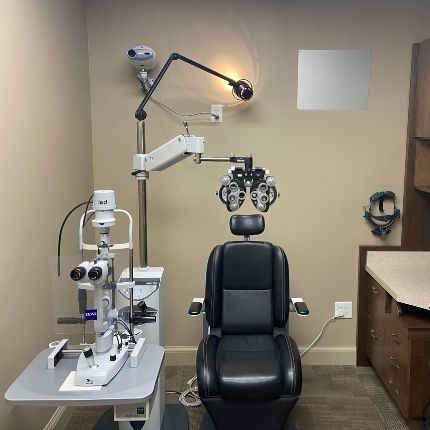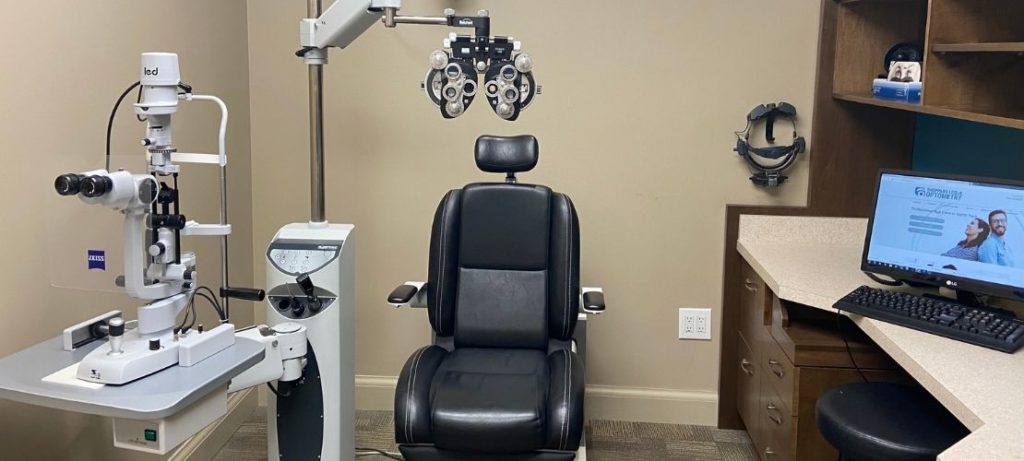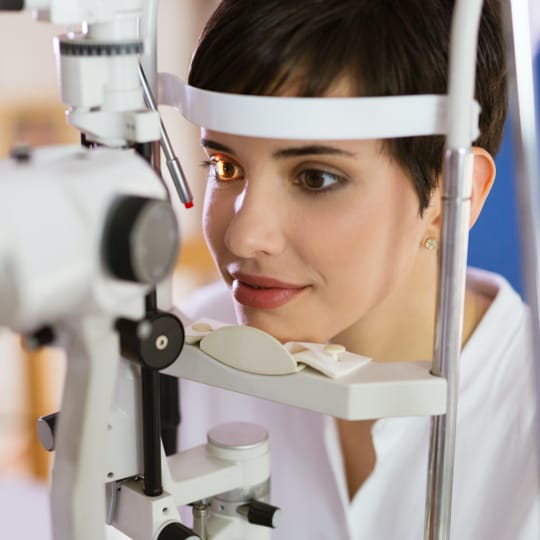Protect Yourself from Vision-Threatening Eye Diseases
When your vision is serving you well, it’s easy to take the health of your eyes for granted. However, as you age, you’re at an increased risk of developing an eye disease that can threaten your vision even before you notice symptoms. A comprehensive exam can detect eye diseases at their earliest stages so that we can begin treatment to prevent vision loss.
Routine eye exams are essential for preserving your sight. Book your eye exam today.

Detecting & Managing Eye Diseases
An estimated 5.59 million Canadians have an eye disease that can lead to sight loss or blindness. The good news is that 75% of all vision loss can be prevented or treated with early intervention. We take a personalized approach to your eye exam to learn your health history and any increased risk factors for eye diseases. We pair this one-on-one time with comprehensive testing that can include:
- Tonometry, to measure the pressure inside your eye. High pressure can be a sign of glaucoma.
- Dilation, if necessary, to allow us a better view of your retina
- High-resolution digital retinal imaging to give us a detailed view of any damage to the structures inside your eyes.
- Visual field testing, to determine if there are any blind spots in your vision and where they are. This is an important tool for detecting glaucoma and our office has made the investment in equipment to ensure the health of your eyes.
If we detect an eye disease, we will explain our findings and what you can expect next. We’ll work with you to develop a treatment plan based on the progression of the disease and the best options to preserve your vision.


Common Eye Diseases & Conditions
Cataracts
A cataract happens when the lens of your eye, which is typically clear, hardens and becomes cloudy or opaque. This change to the lens is part of the normal process of aging, and most typically affects people who are over 60. People with diabetes are much more likely to develop cataracts.
If you have a cataract, you may experience decreased night vision, muted colours, and halos around lights. In the early stages of a cataract’s development, it might have a minimal impact on your vision, but if vision changes begin to affect your daily life, you’ll want to consider cataract surgery. Cataract surgery replaces the clouded lens with an artificial one, effectively restoring vision.
Diabetic Retinopathy
Diabetic retinopathy is a potential complication of diabetes caused by high blood sugar that damages the retina. There are often no symptoms of diabetic retinopathy until the disease advances.
We’ll use diagnostic imaging to get a detailed look inside your eye during a diabetic eye exam. If we detect early signs of diabetic retinopathy, our first recommendation will include you working with your general practitioner or endocrinologist to ensure your diabetes is being managed as well as possible. If the condition progresses, treatment can include medication injections, laser treatment, or an eye surgery called vitrectomy.
Learn more about our eye exams for people with diabetes.
Glaucoma
Called “the silent thief of sight,” glaucoma can rob you of your vision before you ever notice a symptom. A simple test during your regular eye exam can give us information about the pressure inside your eye so we can determine if you have glaucoma, or are at an elevated risk of developing it. Glaucoma is a group of eye diseases characterized by damage to the optic nerve.
The most common type of glaucoma, called open-angle glaucoma, typically progresses without any noticeable effects on your vision, so an eye exam is the only way to detect it. If it’s not treated, glaucoma will cause peripheral vision loss and then central vision loss.
Early treatment options for glaucoma include daily eye drops to manage the pressure inside the eye or laser surgery.
Age-Related Macular Degeneration
Age-related macular degeneration (AMD) occurs when the macula, which is responsible for your central vision, slowly breaks down. AMD typically develops over time and often without symptoms, making an eye exam essential for early diagnosis. AMD is the most common cause of blindness in those over age 55 in North America.
Smoking and high blood pressure both increase your risk for AMD, as does extensive UV exposure. Healthy habits like eating a nutritious diet, quitting smoking, and wearing sunglasses when you’re outdoors can help prevent AMD. Certain dietary supplements, called AREDS 2, may help some types of AMD from progressing. In later stages, treatments may include medication injections into the eye or laser therapy.
Save Your Sight
Preventing vision loss from eye diseases requires detecting and treating them as early as possible. Please book an appointment today for a comprehensive eye exam.

Our Location

Our Address
- 1110 Sheppard Ave E., Unit 400
- North York, ON M2K2W2
Contact Information
- Phone: 416.733.4411
- Email: [email protected]
Our Hours
- Monday: 9:00 AM – 4:00 PM
- Tuesday: 10:00 AM – 7:00 PM
- Wednesday: 9:00 AM – 5:00 PM
- Thursday: 9:00 AM – 6:00 PM
- Friday: 9:00 AM – 4:00 PM
- Saturday: 9:00 AM – 2:00 PM
- Sunday: Closed
Note: Saturday hours are once per month. Please call to confirm.
Our practice is located in Oriole Place Medical and Professional Offices near North York General Hospital, easily serviced by the Sheppard subway line.

Our Services

Comprehensive Eye Exams

Dry Eye Therapy

Laser Eye Surgery Consultations

Emergency Eye Care

Our Brands





See Our Google Reviews




